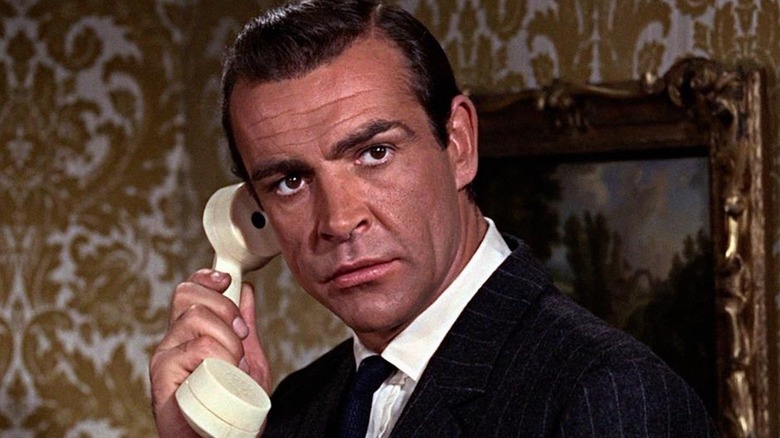The Only Two James Bond Actors To Play Both A Hero & A Main Villain
Now in its 63rd year of existence, the James Bond franchise has experienced its share of turbulence, but though it all has managed to adapt its formula to the ever-changing times without losing its old-school sense of fun. Even when an individual film fails to deliver the goods (e.g. "Diamonds Are Forever," "The Man with the Golden Gun" and "Die Another Day"), fans are still guaranteed the globetrotting exhilaration — be it gripping or goofy — of several major action set pieces jam-packed with practical stunt work. The viewer also knows there will be an array of new gadgets, and they can be fairly certain Bond will team up with a stunning beautiful foil who, now that we live in more enlightened times, will prove every bit his equal in the combat department.
There's also a pleasing sense of continuity with the actors. Starting with Sean Connery, Bond aficionados came to love actors like Bernard Lee as M, Lois Maxwell as Miss Moneypenny, and Desmond Llewelyn as Q — and when these actors retired from their roles, they tended to grow fond of their successors. Obviously, most franchises have a steady company of actors, but there was something charmingly quaint about 007's clockwork deployment of its stock characters. They didn't often play a huge role in the unfolding plot, but Bond couldn't do his job without them (even though he typically made their jobs harder to do).
Among the series' many familiar faces, there are two that were recognizable in considerably different roles. In one film, they played a Bond ally, while in another they were hellbent on trying to kill him. Their dual casting is doubly interesting because they weren't/aren't known for their chameleon-like acting talents.
Charles Gray portrayed an MI6 colleague and Blofeld
When Charles Gray was cast as Tokyo-stationed MI6 agent Dikko Henderson in Bond's fifth big-screen adventure, 1967's "You Only Live Twice," he was just settling into what would become a successful character actor career. Given that viewers at the time didn't have a sure sense of him as a portrayer of somewhat stiff, officious types (most notably in 1975's "The Rocky Horror Picture Show"), they weren't thrown to see him playing a decidedly more agreeable sort — though one wonders throughout just how far Connery's Bond can trust his MI6 colleague. It turns out he can trust him with his life because poor Dikko sacrifices his own during the course of 007's mission.
For those who watched the Bond films out of chronological order and checked out 1971's "Diamonds Are Forever" first, Gray's appearance is especially jarring because he played the character's archenemy Blofeld in the later installment. In this case, the viewer's first instinct is that should Bond shoot Dikko the second he walks through the door (which is a distinct possibility until the latter establishes his identity), and it's a testament to Gray's effectiveness as Blofeld in a very bad movie that he never puts the audience fully at ease on subsequent viewings.
Joe Don Baker went from lethal arms dealer to trustworthy CIA contact
Though Joe Don Baker became an American movie star as the crusading real-life Sheriff Buford T. Justice in Phil Karlson's surprise 1973 box office hit "Walking Tall," and a bona-fide cult flick sensation as the titular lawman in the MST3K vilified actioner "Mitchell," the broad-shouldered Texan always seemed more at home exuding down-home, s***kicker menace in films like "Fletch," "Junior Bonner" and Don Siegel's neo-noir classic "Charley Varrick." Unfortunately, the Bond franchise had already done and been loudly ridiculed for introducing a southern-fried character into its rarified universe (via Clifton James' hayseed Sheriff J.W. Pepper in "Live and Let Die" and "The Man With the Golden Gun"), no one had any reason to believe the series could find a home for such a distinctively tough-guy actor.
This made Baker curious, yet surprisingly spot-on casting for the role of arms dealer Brad Whitaker in Timothy Dalton's first Bond movie, "The Living Daylights." Cleanly coiffed and clad in a hilariously intimidating authoritarian uniform that would've looked smashing on Idi Amin, Baker slathers on the nastiness and only relents when he's finally splayed dead across a miniature battlefield depicting the folly of Waterloo. It's a fitting exit for a ferociously awful character.
He was so dastardly as Whitaker that it was odd to see him turn up as good-guy CIA agent Jack Wade in 1995's "GoldenEye." Cast opposite Pierce Brosnan in his first 007 go-round, Wade is as straight a shooter as a spook can be, and he was so well-suited to the part that the Bond team brought Baker/Wade back for the subsequent film, "Tomorrow Never Dies." Baker might've made his name playing disheveled Southern types, but always cleaned up nicely for the Bond franchise.


